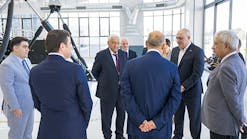Not every AMT has a Master of Divinity degree, but Nathan Griffith does.
Griffith fell in love with aviation as a young child in the back seat of a Grumman AA-5, flown by a family friend. He earned his private pilot’s certificate the summer after he graduated from high school and his A&P certificate together with a Bachelor of Aviation Maintenance Management from Central Missouri State University (now the University of Central Missouri) in Warrensburg, Missouri.
He further pursued both his academic and industry credentials, earning a Master of Divinity from Boston University and adding an Inspector Authorization to his A&P license. He earned a Commercial Pilot's License with Multi-engine Land and Single-engine Sea add-ons. In addition to his pursuits in aviation maintenance, he is a PIC contract pilot for a Part 135 air carrier. Currently he is an AMT instructor at Cape Cod Community College, where he is a faculty member and the academic program coordinator.
Prior to working in education, he was a sheet metal technician for Cape Air at their MRO facility in Hyannis, Massachusetts, and after that, he worked for American Airlines as a line maintenance technician and a line maintenance shift supervisor and supervisor of workload production at Boston Logan International Airport.
Though he started in aviation early, he stepped aside for several years. “While working in the nonprofit sector,” he said, “I gained many valuable skills as well as a perspective of the world which helps sharpen my focus toward aviation maintenance education today.”
He created a mentoring program for at-risk young people in Boston and paired them with college students.
Michael Sasso, AMT program director at Cape Cod Community College, who nominated Griffith for the 40 Under 40 award, said, “He crafted his teaching skills by teaching weekly at the local church, where his mentoring program was based, which helped enhance his own commitment to life-long learning for people of all ages.”
Griffith said, “It was not difficult to see that the lives of the college students in our (non-profit mentoring) program contrasted sharply with the lives of the disadvantaged children of my inner-city neighborhood. When I think about this contrast today, I am inspired by the opportunities that the aviation industry holds for so many people. I believe that these opportunities can be made accessible to and therefore fruitful for a diverse population of people for whom stable, well-paying careers often seem out of reach.”
He also believes aviation maintenance education can lay a bedrock of critical thinking and problem-solving skills, which will not only create safety-conscious technicians but successful members of the local and global community.
“Of course, I love the thrill of it all too,” he said. “The ‘miracle’ of flight, the freedom of travel, the operation of the machines and the troubleshooting of systems.”





